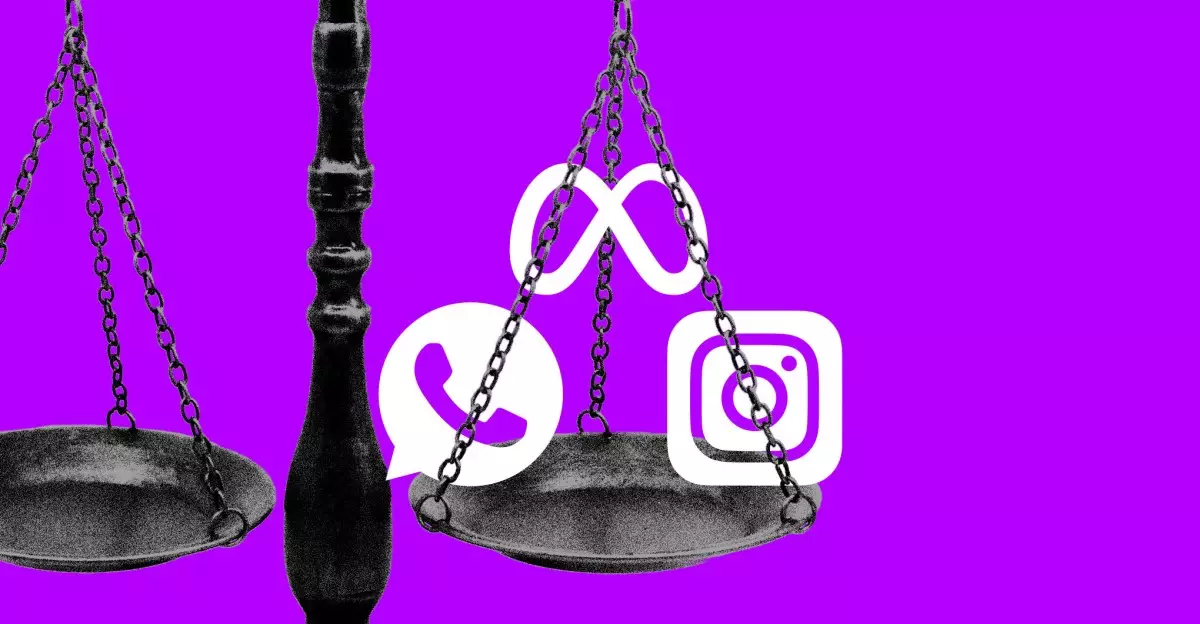In an era defined by rapid technological advancement and omnipresent digital communication, the recent FTC v. Meta trial has magnified the scrutiny surrounding one of the most powerful figures in the tech world, Mark Zuckerberg. As the trial unfolds, it brings forth crucial questions about corporate strategy, market competition, and technology’s impact on society. At the heart of these discussions is Zuckerberg’s bold assertion: that his acquisitions—WhatsApp and Instagram—were never intended to neutralize potential competition but rather to enhance Meta’s overall value and adaptability in a shifting landscape.
Zuckerberg’s Unwavering Confidence
The persuasive power of Zuckerberg’s testimony is undeniable. When asked if he would pay $19 billion for WhatsApp again, his cheerful affirmation not only reinforced his confidence in the decision but also underscored the strategic foresight that led to this landmark acquisition. It’s intriguing to consider the context in which this deal was made. The burgeoning popularity of private messaging platforms threatened to shift users’ interactions from public panels like Facebook to more intimate conversations. Recognizing this, Zuckerberg viewed WhatsApp not as a rival to eliminate but as an opportunity to facilitate and embrace this natural evolution of communication.
Through a lens of strategic urgency, Zuckerberg’s willingness to invest in WhatsApp illustrates a deeper understanding of user behavior that goes beyond corporate rivalry. The major takeaway here is that what might appear as monopolistic behavior could, through a detailed examination, actually represent a visionary approach to ensuring Meta’s relevance in an evolving digital ecosystem.
Reframing the Competition Narrative
Interestingly, the FTC’s core argument hinges on the idea that Zuckerberg purchased WhatsApp and Instagram to eradicate competition—allegations that he fervently contests. The moments of confrontation in the courtroom highlight a struggle not just for corporate power but also for interpretation of intent. Zuckerberg described his interactions with WhatsApp’s founders as less about a commodifiable threat and more about a philosophical divide; he perceived them as lacking ambition in a space that he viewed as ripe for innovation. This paints a picture of Zuckerberg not as a destroyer of competition but as a strategist who aimed to cultivate rapid growth and development within the platforms he acquired.
The narrative surrounding Instagram poses a slightly different complexity. Initially, Zuckerberg, while deciding to acquire Instagram, did not see it as a direct competitor until its user base grew significantly. Here, the FTC’s claims that Zuckerberg sought to neutralize Instagram’s potential for influence become harder to sustain when weighed against the reality of the investment and the resources poured into the platform for expansion. Zuckerberg’s argument—that he proactively shielded Instagram from becoming too reliant on Facebook traffic—demonstrates a reluctant acceptance of risk that is inherent in the tech industry.
The Importance of Strategic Growth
Reviewing the financial and user growth statistics unveils a critical layer to Zuckerberg’s testimony. With WhatsApp’s user base approaching 3 billion—a number that exceeds initial predictions of 2 billion by 2024—the financial implications are staggering. Meta charms its stakeholders with tangible returns, generating $10 billion annually from advertising across its platforms highlighting the clear benefits derived from these acquisitions. Herein lies a vital argument: any claims of a “catch-and-kill” strategy must contend with the elevated value and user engagement fostered through these integrations.
Yet, one must ponder the competing interests that these platforms uncover. What grows tremendously in one area may suffocate innovation in another. Zuckerberg’s testimony did brush against the conflicts of interest that arise in maintaining multiple platforms—some may argue that resource allocation may undercut innovation across the board.
Reflections on Corporate Growth and Responsibility
As Zuckerberg’s testimony converges with an increasing global conversation about the responsibilities of tech giants, another layer emerges. The dialogue surrounding Meta encapsulates a reflection on not just what it means to innovate, but how to do so responsibly in an ecosystem dominated by a few key players. While Zuckerberg’s defense is grounded in a vision for a more connected future through the diversification of options, it also invites scrutiny regarding the ethical implications of such concentrated power.
Zuckerberg’s confidently articulated defense throughout the trial challenges us to reconsider the narrative we hold onto regarding monopolistic practices in tech. By emphasizing a vision of growth and opportunity rather than suppression, it forces industry analysts, policymakers, and everyday users alike to contend with the duality inherent in tech innovation—where disruption and monopoly can oftentimes become two sides of the same coin.

